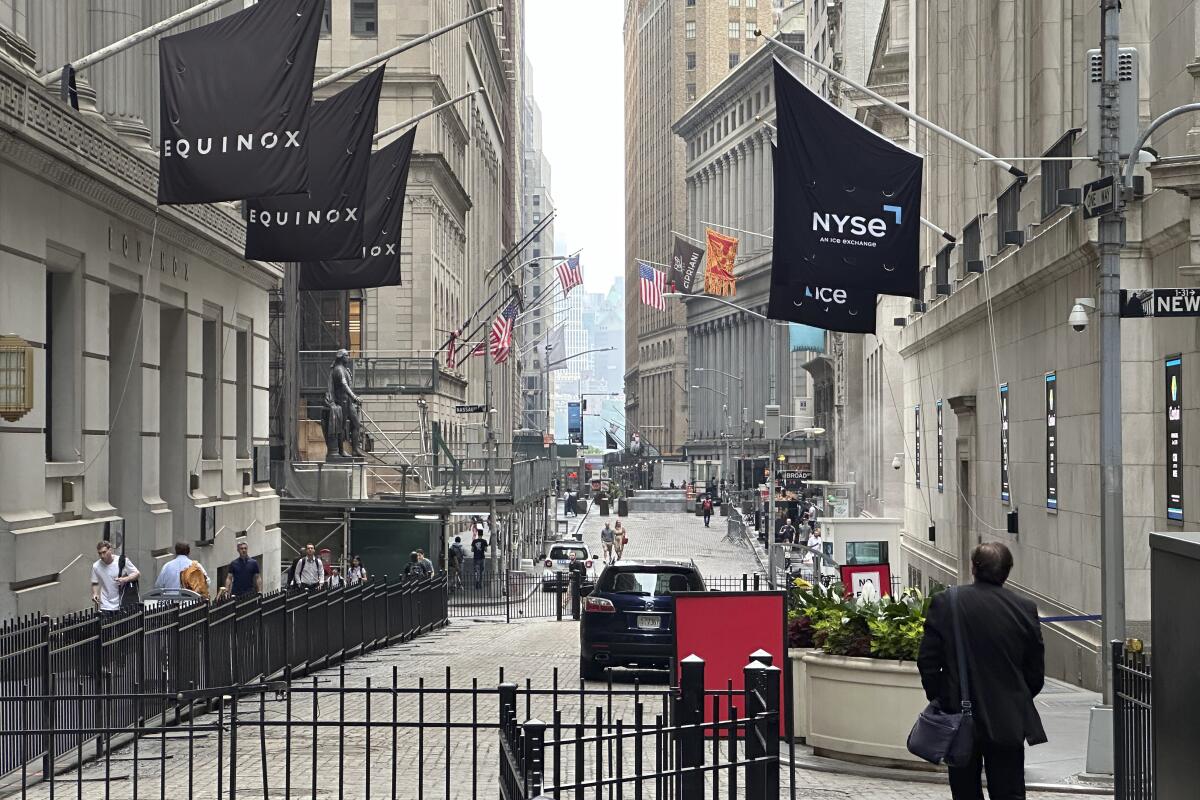Wall Street drifts, yields jump and Paris stocks soar as elections drive markets

NEW YORK — U.S. stocks drifted to a mixed finish Monday, and yields jumped in the bond market as elections continue to drive swings in financial markets worldwide.
The Standard & Poor’s 500 index rose 0.3% to kick off a shortened, four-day week that includes the Fourth of July holiday. The Dow Jones industrial average edged up by 0.1%, and the Nasdaq composite gained 0.8%.
Some of the world’s strongest action was across the Atlantic, where the CAC 40 index in Paris jumped as much as 2.8% before settling to a gain of 1.1%. Results from France suggested a far-right political party may not win a decisive majority in the country’s legislative elections. That bolstered hopes for potential gridlock in the French government, which would prevent a worst-case scenario in which a far-right with a clear majority could push policies that would greatly increase the French government’s debt.
This is a big year for elections worldwide, with voters heading to the polls in the United Kingdom later this week and soon elsewhere. In the United States, pollsters are measuring the fallout from last week’s debate between President Biden and former President Trump. It all underscores “political polarisation and how elections are determining economics, rather than vice versa,” according to Nick Gentle and other members of the product management group at Barclays.
Trump Media & Technology Group, whose stock has been rising and falling with Trump’s White House chances, climbed 1% to $33.08. Shares of the company behind Trump’s Truth Social platform, though, are still well below their perch of roughly $70 reached earlier this year.
The bond market was home to some of U.S. markets’ strongest action. Treasury yields jumped again, as they did Friday immediately the Biden-Trump debate. Increased prospects for a Republican sweep in November sent traders back to moves from 2016, according to strategists at Morgan Stanley. Besides pushing rates higher, traders also piled into stocks of oil-and-gas and financial companies.
The yield on the 10-year Treasury climbed to 4.46% from 4.39% late Friday and from 4.29% late Thursday. It’s a reversal of the general trend since the spring, when the 10-year Treasury yield had topped 4.70% in late April.
Yields had been largely easing on hopes inflation will slow enough to convince the Federal Reserve to cut its main interest rate later this year, down from the highest level in more than two decades. High rates have been grinding on the U.S. economy by making it more expensive to borrow money for a house, car or anything else.
Hopes for rate cuts held after a report Monday showed U.S. manufacturing weakened last month by more than economists expected. Perhaps even more importantly for Wall Street, the report from the Institute for Supply Management also said price increases are decelerating. Taken together, the data could offer more of the evidence that the Federal Reserve wants to see of lessening pressure on inflation before it will cut rates.
This week’s economic highlight is expected Friday, when the U.S. government will say how many workers employers hired during June. Economists predict overall hiring slowed to 190,000 from May’s 272,000. That would get the number closer to what Bank of America calls the “Goldilocks” figure of roughly 150,000, give or take 25,000.
At that level, the U.S. economy could continue to grow and avoid a recession without being so strong that it puts too much upward pressure on inflation.
On Wall Street, Chewy swung from a big early gain to a loss of 6.6% after a widely followed trader named Keith Gill revealed he owned a little more than 9 million shares of the pet supply company. That’s about 6.6% of the entire company, according to a filing made Monday with the Securities and Exchange Commission.
Gill came to fame during the original meme-stock craze of 2021 that saw GameStop rally to market-bending heights. Gill, who goes by “Roaring Kitty” and other nicknames, became the face of fans pushing GameStop upward. Gill had returned to talking about GameStop again recently, which helped its stock rally. But it fell 5.5% Monday after Gill’s disclosure about Chewy.
Elsewhere on Wall Street, Spirit AeroSystems rose 3.3% after Boeing said it would buy the maker of fuselages and other airplane parts for $4.7 billion in stock.
Boeing, which rose 2.6%, has been facing tougher scrutiny from the government and customers over worries about safety and quality. Boeing previously owned Spirit AeroSystems, and the purchase reverses a longtime company strategy of outsourcing key work on its passenger planes.
Meta Platforms edged 0.1% higher after European Union regulators accused it of breaching the bloc’s new digital competition rulebook by forcing Facebook and Instagram users to choose between seeing ads or paying to avoid them.
All told, the S&P 500 rose 14.61 points to 5,475.09, even though 3 in 4 stocks within the index fell. Gains for Meta and other big, influential companies, such as Nvidia’s 0.6% rise, overshadowed those losses.
The Dow gained 50.66 to 39,169.52 , and the Nasdaq composite rose 146.70 to 17,879.30.
In stock markets abroad, Japan’s Nikkei 225 added 0.1% after a quarterly survey by the Bank of Japan called the “tankan” showed a modest improvement in confidence among the country’s largest manufacturers. Stocks in Shanghai rose 0.9% following mixed economic data.
Choe writes for the Associated Press.
More to Read
Inside the business of entertainment
The Wide Shot brings you news, analysis and insights on everything from streaming wars to production — and what it all means for the future.
You may occasionally receive promotional content from the Los Angeles Times.










